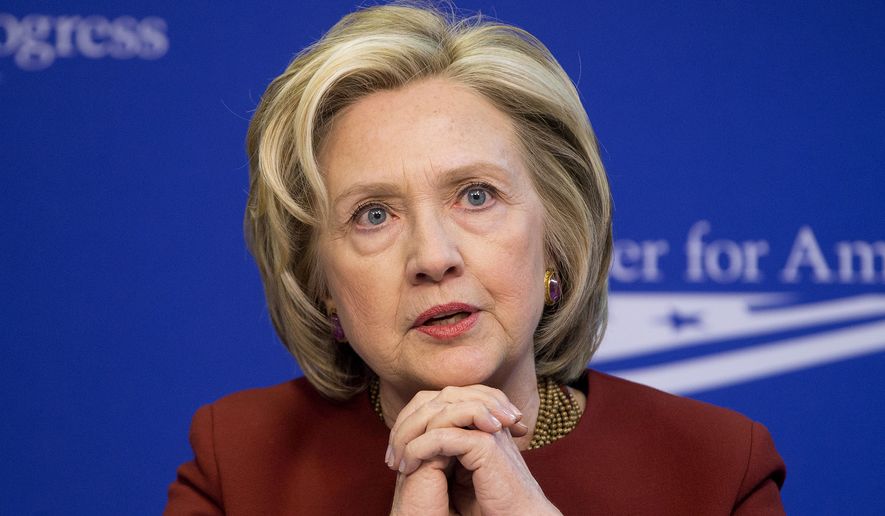Former Secretary of State Hillary Rodham Clinton is losing ground against much of the prospective 2016 GOP presidential field in key swing states as her favorability drops and voters question her honesty and trustworthiness, according to results released Thursday by Quinnipiac University.
Sen. Rand Paul of Kentucky, who announced he was running for president on Tuesday, leads Mrs. Clinton by 3 points, 44 percent to 41 percent, in Colorado. Sen. Marco Rubio of Florida and Wisconsin Gov. Scott Walker both lead her by a point, and she’s tied with former Arkansas Gov. Mike Huckabee at 41 percent apiece. She leads New Jersey Gov. Chris Christie by 2 points, 41 percent to 39 percent.
Sen. Ted Cruz of Texas, who announced his own bid for the presidency last month, trails Mrs. Clinton by 1 point, 42 percent to 41 percent, while she leads former Florida Gov. Jeb Bush by 3 points, 41 percent to 38 percent.
But in a February Quinnipiac poll, she led Mr. Paul and Mr. Walker by 2 points apiece in Colorado, and the two were the closest to her in that state; she led Mr. Christie and Mr. Bush by 9 and 8 points, respectively.
In Iowa, she leads both Mr. Rubio and Mr. Cruz by 3 points, 43 percent to 40 percent, and leads Mr. Christie by 2 points, 41 percent to 39 percent. She leads Mr. Walker by 4 points, 44 percent to 40 percent, and Mr. Bush by 1 point, 41 percent to 40 percent. Mr. Huckabee, who won the 2008 Iowa caucuses, ties her at 42 percent apiece.
Mr. Paul, meanwhile, who is selling his competitiveness in head-to-head match-ups with Mrs. Clinton as one feature of his candidacy, is at 43 percent to Mrs. Clinton’s 42 percent in the Hawkeye State.
“These numbers are a boost for U.S. Sen. Rand Paul of Kentucky as he formally launches his campaign,” said Peter A. Brown, assistant director of the Quinnipiac University Poll.
And her closest challenger in Iowa in February was Mr. Huckabee, who she led by 7 points, 45 percent to 38 percent.
Mr. Paul gives Mrs. Clinton the closest race in Virginia, trailing her by 4 points, 47 percent to 43 percent. She leads both Mr. Bush and Mr. Walker by 7 points, 47 percent to 40 percent, and bests Mr. Christie by 6 points, 46 percent to 40 percent. She leads Mr. Huckabee and Mr. Rubio by 8 points each, 48 percent to 40 percent, and beats Mr. Cruz by 10 points, 49 percent to 39 percent.
She did widen her lead in Virginia against the GOP contenders, notably Mr. Bush, who she was tied with at 42 percent then (that survey did not ask about Mr. Rubio).
But majorities in Colorado and Virginia say Mrs. Clinton is not honest and trustworthy, and 49 percent of Iowa voters say she is not, compared to 43 percent who say she is.
Voters are split on whether the controversy over Mrs. Clinton’s setting up a private email system and server while she was serving as secretary of state will affect their vote, but majorities in each state say serious questions remain.
“Ominous for Hillary Clinton is the broad scope of the movement today compared to her showing in Quinnipiac University’s mid-February survey. It isn’t just one or two Republicans who are stepping up; it’s virtually the entire GOP field that is running better against her,” Mr. Brown said. “That’s why it is difficult to see Secretary Clinton’s slippage as anything other than a further toll on her image from the furor over her e-mail.”
Voters were mixed best toward the GOP field in terms of favorability ratings, but Mrs. Clinton’s ratings have taken a hit in Colorado and Iowa. She had a negative 41 percent to 51 percent favorability rating in Colorado, compared to a 46 percent to 47 percent split in February.
In Iowa, she’s now at a 45 percent to 47 percent favorable/unfavorable split, compared to a positive 49 percent to 40 percent split in February.
Her 48 percent to 45 percent split in Virginia mirrors February’s 48 percent to 44 percent split.
From March 29-April 7, Quinnipiac surveyed:
• 894 Colorado voters with a margin of error of plus or minus 3.3 percentage points.
• 948 Iowa voters with a margin of error of plus or minus 3.2 percentage points.
• 961 Virginia voters with a margin of error of plus or minus 3.2 percentage points.
• David Sherfinski can be reached at dsherfinski@washingtontimes.com.




Please read our comment policy before commenting.